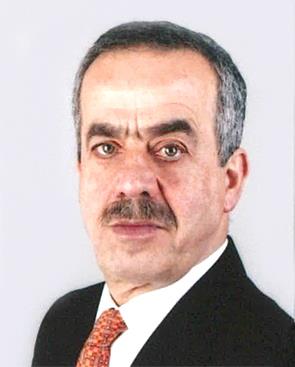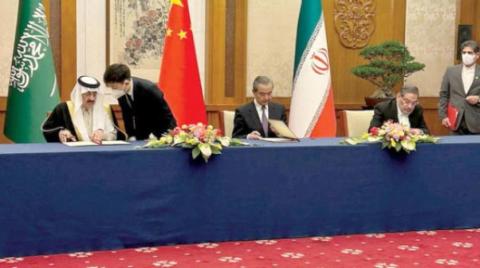
In an Arab city, a hotel employee told me: “I am waiting to leave to Sweden. This is the only solution. I will not marry here, nor will I have children. I will not repeat my parents’ mistake.”
His words, weighed down by despair, seized me. What opportunities can Lebanon provide for a child born today on its soil? What food? What healthcare? What education or job opportunity? What opportunities can Syria provide for those born today on its land? The same question is asked about Yemen, Libya and other countries, such as Iraq, which sleeps on an enormous wealth.
The Middle East cannot head towards the coming decades while still relying on its old dictionaries. It cannot live long with the rhetoric of conflict, failure, corruption, extravagant regional adventures and small wars within maps.
I was shocked when Mustafa al-Kadhimi, the former Iraqi prime minister, told me that corruption had devoured more than $600 billion of Iraq’s money in less than two decades. It’s a massive amount that was squandered to strengthen party and military groups, enrich people or spend on regional roles.
The reality of the Middle East is painful and portends grave dangers. Corrupt, failed or semi-failed governments occupy large parts of it, amid a disturbing absence of auditing, correction and accountability mechanisms and a lack of a judiciary that adheres to the scales of justice. Parliaments are preoccupied with disputes over quotas, while they empty development plans of any viability.
It is caught in a sweeping tendency to abuse the state and its capabilities for the sake of employing those with guaranteed loyalty, while disregarding degrees of competence.
It’s a difficult reality that portends the worst: stagnant economies, crumbling currencies, and the absence of the most basic services. Cities where the unemployed invade the streets. Young men overcome the harshness of unemployment with dreams of emigration, and among them are those who are driven by despair to the “boats of death.” In this climate, any young man, who possesses dreams, ambitions, and abilities, rushes to stand at the doors of embassies in search of an alternative homeland, while his homeland loses its best young men and women.
The Middle East cannot face the coming decades with the old rhetoric. It needs another dictionary that puts progress above the obsession with victory. There is no higher goal than improving people’s standard of living, arming the young generation with the tools of development, and motivating them to produce and innovate.
Wealth was lost and budgets depleted due to mutual fear between maps or in wars of ruptures within them. The relationship with time is crucial for the future of individuals. It is also important for states. Wasting lives due to failed policies and surrendering to old ideas will only deepen poverty, despair and violence and accumulate explosive factors.
These questions came to my mind while I was following, like many people in the Middle East, the dimensions of the Chinese-Saudi-Iranian statement. A magical phrase stopped me: “Respect for the sovereignty of states and non-interference in their internal affairs.” One does not need figures to prove the disastrous results of the violation of maps and attempts to bring about political, security and demographic changes in them.
Interferences have distorted the maps and put them in the grip of open civil conflicts, in which fear for identity is coupled with the fear for the future.
Any serious respect for the sovereignty of states will give their peoples an opportunity to take a breather, re-assess priorities and seriously think about their responsibility towards future generations.
It will give serious governments the opportunity to preoccupy themselves with addressing poverty, unemployment, displacement problems, declining education, the absence of necessary health care, and the country’s lack of institutions that plan, implement and monitor.
The decision to restore Saudi-Iranian ties with Chinese support is a major event for bilateral relations between two well-established countries in the region, as well as for the entire Middle East. Some previous experience calls for waiting to see which track the train that departed from the Chinese station will take. What’s more important than the signatures on agreements is the actual execution of intentions and the implementation of decisions.
It is remarkable that China appears as a sponsor of solutions in an area that is vital for its economy. It is useful to remember that China deserved this role because of what it did in the past four decades. Beijing has abandoned the project of changing the world with ideological breakthroughs and turned inward, by developing schools and factories, combating poverty, and catching up with scientific and technological progress.
The Chinese leadership refrained from throwing its dictionary into the fire to avoid instability. On the contrary, it safeguarded the country’s stability, but adjusted the rhetoric in light of facts and needs. It opened windows, respected numbers, redoubled efforts, promoted innovation and accumulated achievements. Thus, China was able to talk about lifting 700 million citizens out of poverty, and thus it deserved the position of the second greatest economy in the world.
We can imagine what Iran would have been like today if it had spent the past four decades operating with the mentality of Mao Zedong’s heirs. We can look at the Saudi experience, which succeeded in launching during a few years a renaissance that improved the standard of living of the citizens, and consolidated the country’s role at the international level.
Saudi Arabia opened its horizons, with an ambitious vision, strategic partnerships, a youthful energy, and an accelerated endeavor to benefit from and engage in technological progress.
The Kingdom has chosen its priorities: achieving development, improving the living standards of its citizens and striving to spread stability and progress in the region by building an attractive model.
As construction also needs an appropriate environment, Saudi Arabia extended its hand to the countries of the region, on the basis of dialogue as the only method for solving problems, and respect for the sovereignty of states and non-interference in internal affairs.
The people of the Middle East are condemned to live under its roof. Respecting the right to differ is necessary under international laws and conventions. No party has the right to impose the uniform by force, intrusions, or drones. The only option is fostering coexistence, spending budgets on building universities and bridges, and participating in the scientific and technological race.
The Middle East is tired of decades of rupture, violence and failure. It was time for it to catch its breath. The Chinese appointment may open a window to stability that can only be consolidated with a new approach within the fractured countries themselves. If China had spent the past four decades in stagnation, isolation, and the limitations of old formulas, it would be a burden on the world today.
Here is Xi Jinping’s country transforming into a locomotive of progress, looking to sponsor solutions in a world where the roles constantly change, especially within the club of major powers.












